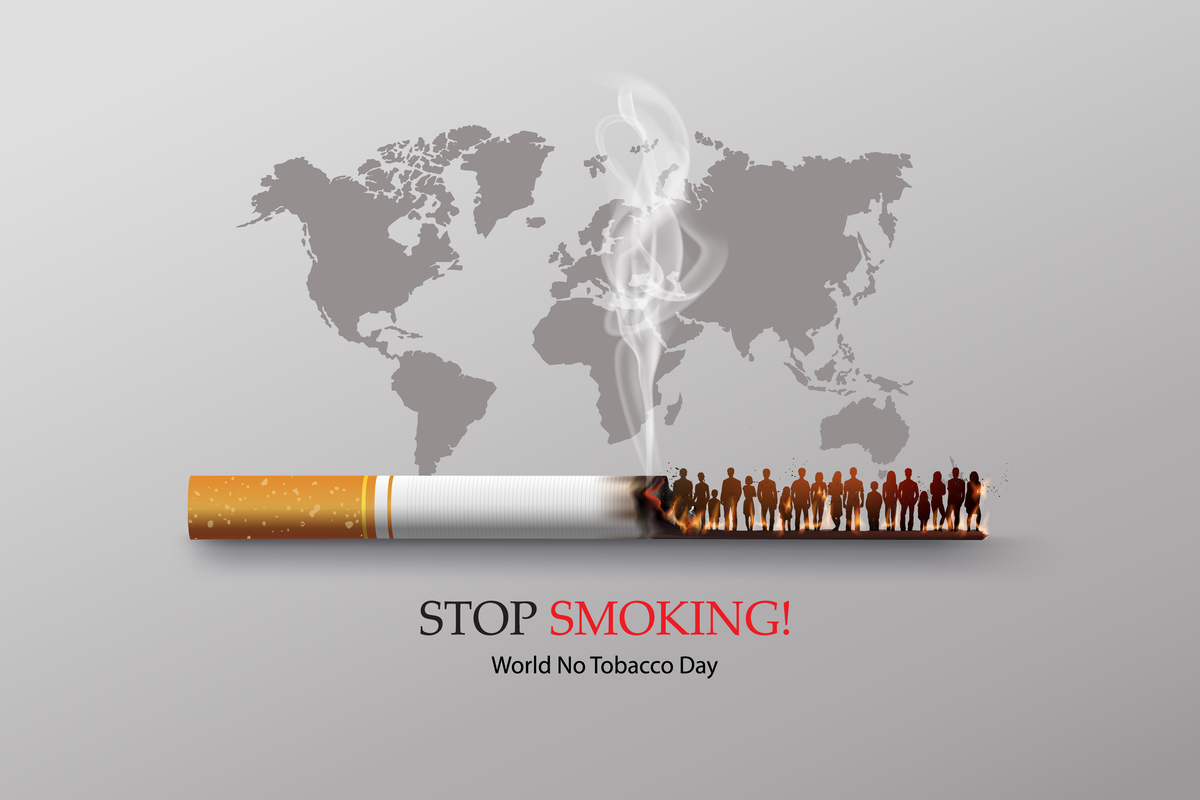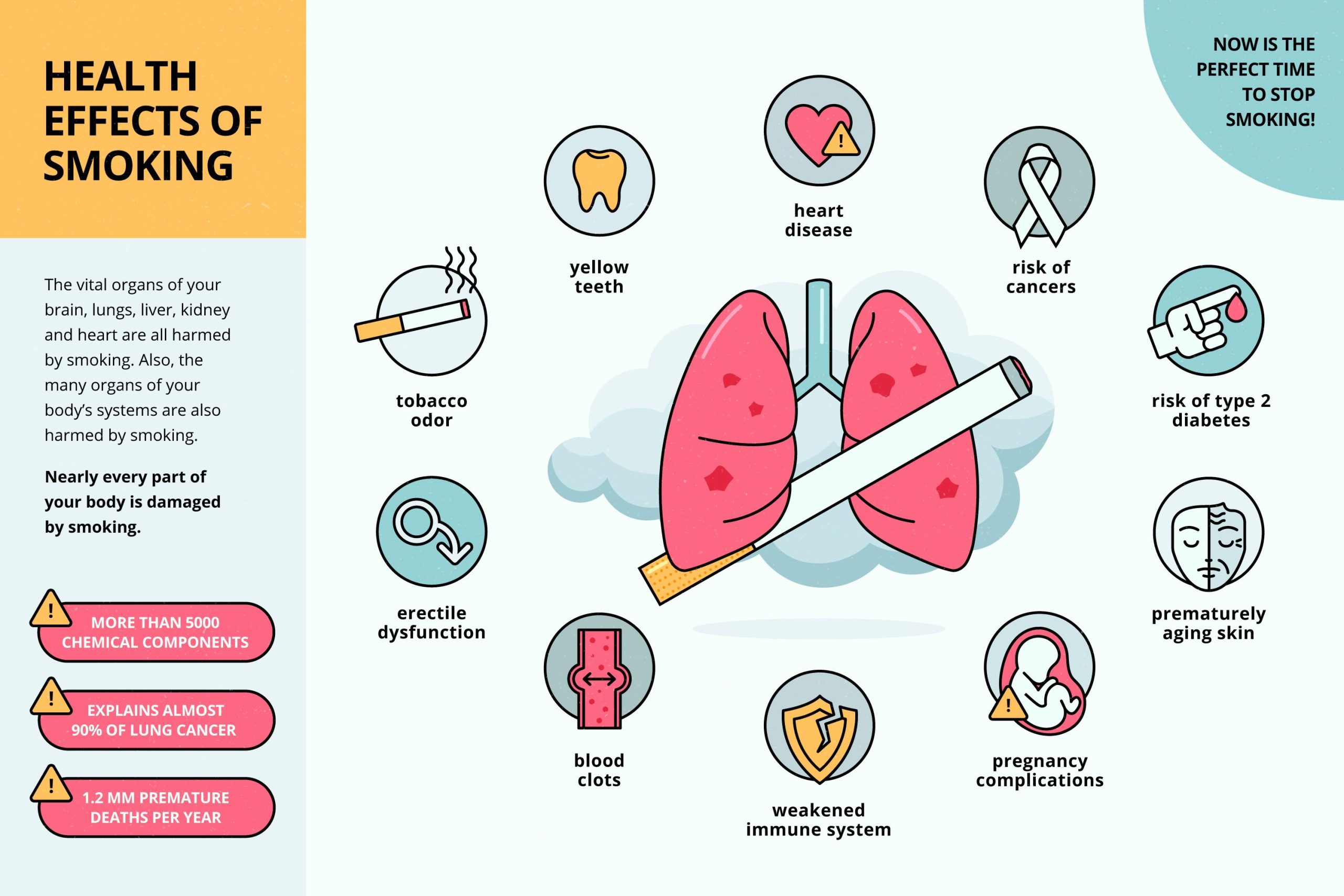 May 26, 2023
May 26, 2023
Why Should You Quit Tobacco?
Tobacco has been consumed in India for a long time now. Promoting awareness about the health risks of tobacco, providing access to cessation services, and implementing comprehensive tobacco control policies are crucial to reducing tobacco use in India. It's the need of the hour to know more about this growing addiction in India so that it can be stopped as soon as possible.
Q. What is tobacco? Why is it so popular in India?
A: Tobacco is a plant cultivated for its leaves, which are dried and processed for various uses. It contains the addictive substance nicotine, making it highly sought after for its psychoactive effects. Tobacco is commonly consumed in various forms, such as smoking cigarettes, cigars, bidis, and pipes, chewing tobacco, and using snuff.
India is the second-largest consumer and producer of tobacco globally, with a significant portion of its population using tobacco in different forms. In addition, tobacco use is prevalent across various socioeconomic groups.
Various factors contribute to the high tobacco consumption in India. Some key drivers include cultural practices, social acceptance, lack of awareness about health risks, and targeted marketing by the tobacco industry. In addition, the affordability and accessibility of tobacco products, especially among vulnerable populations, further exacerbate the problem.
Tobacco consumption in India is associated with a wide range of health issues and contributes to the country's high burden of non-communicable diseases (NCDs). According to the Global Adult Tobacco Survey (GATS) India, tobacco use is a leading risk factor for cardiovascular diseases, respiratory diseases, cancers (particularly oral and lung cancer), and other health problems. In addition, it is responsible for a substantial number of premature deaths and disabilities each year.
Q. How is tobacco harmful to us?
A: Tobacco use poses significant health risks and has many harmful effects on individuals. In the context of the Indian population, where tobacco consumption is prevalent, understanding these risks is crucial for public health interventions and awareness campaigns. The harmful effects of tobacco are detailed below:
- Cancer: Tobacco use is a leading cause of cancer, particularly oral and lung cancer. In India, many cancer cases are directly linked to tobacco consumption. The carcinogenic substances in tobacco, such as nicotine, tar, and various toxic chemicals, can damage DNA and lead to the development of cancerous cells in the body.
- Respiratory Diseases: Smoking tobacco is a significant risk factor for respiratory diseases like chronic obstructive pulmonary disease (COPD), including chronic bronchitis and emphysema. COPD causes progressive lung damage, leading to breathing difficulties, coughing, wheezing, and reduced quality of life.
- Cardiovascular Diseases: Tobacco use significantly increases the risk of cardiovascular diseases (CVD), including coronary heart disease, stroke, and peripheral vascular diseases. The chemicals in tobacco smoke can damage blood vessels, cause plaque buildup, and increase the likelihood of blood clots, leading to heart attacks and strokes. In India, tobacco-related CVDs contribute to a number of diseases and premature deaths.
- Reproductive Health: Both smoking and smokeless tobacco use can adversely affect reproductive health. For example, smoking during pregnancy increases the risk of complications such as premature birth, low birth weight, stillbirth, and infant mortality. In addition, smokeless tobacco use has adverse effects on male and female fertility, including reduced sperm quality and infertility.
- Oral Health: Tobacco use, particularly chewing tobacco and betel quid (paan) with tobacco, significantly impacts oral health. It increases the risk of oral diseases such as gum disease, tooth decay, oral leukoplakia (precancerous white patches in the mouth), and oral cancer. India has one of the highest burdens of oral cancer globally, primarily due to tobacco-related habits.
- Addiction and Dependence: Nicotine, the addictive component of tobacco, leads to physical and psychological dependence. In addition, tobacco users often find quitting challenging due to withdrawal symptoms and cravings, perpetuating a cycle of addiction. As a result, nicotine addiction can harm mental health, well-being, and quality of life.
Notably, these harmful effects are not limited to active smokers but also extend to secondhand smoke exposure. In addition, non-smokers exposed to tobacco smoke are at an increased risk of developing similar health problems.
 Q. Are there any benefits to using tobacco?
A
Q. Are there any benefits to using tobacco?
A: Tobacco use is widely recognized as harmful to health, and no significant health benefits are associated with its consumption. However, it is important to acknowledge that some individuals may perceive specific short-term effects or personal help from tobacco use, such as a temporary sense of relaxation or appetite suppression. It is important to highlight that the perceived benefits of tobacco use are mainly subjective and short-term, while the long-term health risks are well-established and significant. The harmful effects of tobacco on various aspects of health, including cancer, cardiovascular diseases, respiratory disorders, and reproductive health, are extensively documented.
Q. How to stop using tobacco?
A: Quitting tobacco can be challenging, but with determination and support, it is achievable. Here are some steps and strategies to help individuals stop using tobacco:
- Motivation and Commitment: Develop a strong personal motivation to quit tobacco. First, reflect on the health risks, financial implications, and impact on your well-being and the well-being of your loved ones. Then, make a firm commitment and set a quit date to start your journey toward a tobacco-free life.
- Seek Support: Reach out for support from family, friends, and healthcare professionals. Inform them about your decision to quit and ask for their encouragement and assistance. Consider joining support groups or seeking counseling services that provide guidance, motivation, and strategies for quitting tobacco.
- Identify Triggers and Develop Coping Strategies: Recognize the situations, emotions, or activities that trigger your tobacco use. Then, develop alternative coping strategies to deal with these triggers, such as engaging in physical exercise, practicing deep breathing, or distracting yourself with a hobby or activity. Finally, replace the habit of tobacco use with healthier alternatives.
- Nicotine Replacement Therapy (NRT) and Medications: Consider using nicotine replacement therapy (NRT) products, such as nicotine gums, patches, lozenges, inhalers, or nasal sprays, to help manage cravings and withdrawal symptoms. Consult a healthcare professional for guidance on the appropriate use of NRT or medications like bupropion or varenicline. These medications work by reducing cravings and withdrawal symptoms associated with nicotine addiction.
- Alternative Therapies: Some individuals find alternative therapies helpful in quitting tobacco. For example, techniques like acupuncture, hypnotherapy, and mindfulness-based interventions have been explored as complementary approaches to tobacco cessation. While the evidence for their effectiveness is limited, you may find them beneficial when used with evidence-based strategies.
- Make Lifestyle Changes: Adopt a healthy lifestyle to support your tobacco cessation efforts. Engage in regular physical exercise, maintain a balanced diet, and get enough sleep. Avoid alcohol and limit caffeine intake, as these substances can trigger tobacco cravings. Focus on managing stress through relaxation techniques or activities like meditation or yoga.Remember, quitting tobacco is a process, and each individual's journey is unique. So be patient, celebrate your progress, and focus on the long-term health benefits of being tobacco-free.
Q. Why is World No Tobacco Day celebrated?
A: World No Tobacco Day is celebrated on May 31st every year to raise awareness about the harmful effects of tobacco use and promote tobacco control efforts worldwide. It provides an opportunity to educate individuals, communities, and policymakers about tobacco's detrimental impact on various health aspects.
The day aims to promote and support effective tobacco control policies at the national and international levels. It highlights the importance of implementing comprehensive measures such as smoke-free policies, bans on tobacco advertising and promotion, graphic health warnings on tobacco products, and increased taxation on tobacco to reduce consumption.
World No Tobacco Day sheds light on the tactics employed by the tobacco industry to promote tobacco use and undermine public health efforts. It exposes deceptive marketing practices, corporate strategies targeting youth and vulnerable populations, and industry interference in tobacco control policies. The day seeks to mobilize public support and engage various stakeholders, including governments, non-governmental organizations, healthcare professionals, and communities, in the fight against tobacco. It provides an opportunity to showcase success stories and achievements in tobacco control.
Appropriate medical treatment and care is crucial to avoid any associated medical complications.
To book an appointment, contact us at +91-9540 114 114.
 May 26, 2023
May 26, 2023
 Q. Are there any benefits to using tobacco?
A: Tobacco use is widely recognized as harmful to health, and no significant health benefits are associated with its consumption. However, it is important to acknowledge that some individuals may perceive specific short-term effects or personal help from tobacco use, such as a temporary sense of relaxation or appetite suppression. It is important to highlight that the perceived benefits of tobacco use are mainly subjective and short-term, while the long-term health risks are well-established and significant. The harmful effects of tobacco on various aspects of health, including cancer, cardiovascular diseases, respiratory disorders, and reproductive health, are extensively documented.
Q. How to stop using tobacco?
A: Quitting tobacco can be challenging, but with determination and support, it is achievable. Here are some steps and strategies to help individuals stop using tobacco:
Q. Are there any benefits to using tobacco?
A: Tobacco use is widely recognized as harmful to health, and no significant health benefits are associated with its consumption. However, it is important to acknowledge that some individuals may perceive specific short-term effects or personal help from tobacco use, such as a temporary sense of relaxation or appetite suppression. It is important to highlight that the perceived benefits of tobacco use are mainly subjective and short-term, while the long-term health risks are well-established and significant. The harmful effects of tobacco on various aspects of health, including cancer, cardiovascular diseases, respiratory disorders, and reproductive health, are extensively documented.
Q. How to stop using tobacco?
A: Quitting tobacco can be challenging, but with determination and support, it is achievable. Here are some steps and strategies to help individuals stop using tobacco: